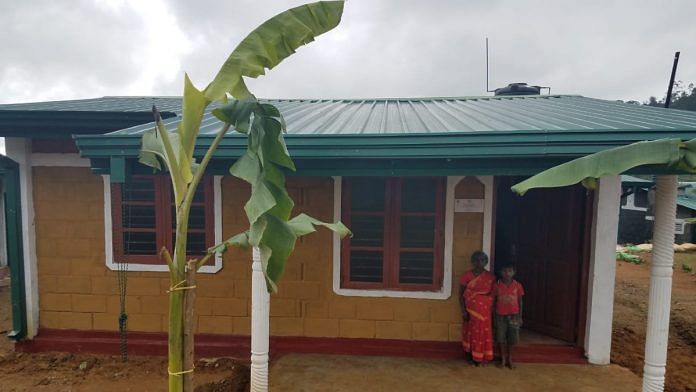New Delhi: Two hundred years ago, thousands of indentured Tamil labourers landed on the shores of Sri Lanka, and made the long, arduous journey to its central and southern hills to work in tea, coffee, and rubber plantations.
Today, they’re one of the most marginalised communities in Sri Lanka.
Brought by the British from India, the Malaiyaha (Hill Country) Tamils, or Indian-origin Tamils, have borne the brunt of several injustices — from being stripped of their citizenship to working in inhumane conditions on tea plantations.
Various groups in Sri Lanka, including political parties, have been holding events to commemorate the 200-year journey of this community in the country.
On Thursday, a programme called Naam 200 — which translates to ‘We are 200’ — will be attended by the likes of Union Finance Minister Nirmala Sitharaman, Tamil Nadu Finance Minister Thangam Thenarasu, Congress MP Shashi Tharoor, and Tamil Nadu BJP chief K. Annamalai. Dignitaries from Malaysia will also be attending the event.
Key highlights of the event include the announcement of a land and housing rights programme for landless tea plantation workers, and the introduction of a charter with several policy initiatives to improve their living conditions and uplift the community.
“This industry has kept Sri Lanka afloat and kept our welfare policy programmes alive,” said Aritha Wickremesinghe, an adviser to Sri Lanka’s Ministry of Water Supply and Estate Infrastructure Development, and President’s Office.
“The fact that we have exploited this labour to run this economy and its many welfare schemes — while denying them significant rights — is a problem that needs to be resolved now.”
Earlier this year, the Indian government signed off on a grant of Rs 75 crore for development projects aimed at the Malaiyaha Tamils, to be used for education and health initiatives in the tea-estate region.
The grant was announced during Sri Lankan President Ranil Wicremesinghe’s visit to New Delhi on 21 July, and will be in addition to India’s ongoing project to build 14,000 homes for families residing on the estates.
Also Read: India-Sri Lanka ferry service brings Tamils closer to Tamils. It’s smart economics too
History of the community
The Malaiyaha Tamils live in upcountry Sri Lanka.
The history of Sri Lankan tea plantations and its workers is tied to the ethnic make-up of the island nation — and the upcountry Tamils are at the bottom of the totem pole. The community is a distinct ethnic group, constituting the fourth largest population on the island nation — following the Sinhalese, the ‘Sri Lankan’ Tamils, and the Muslim community.
The Malaiyaha Tamils are separate from the Tamil communities in the north and east, who have a much longer history in Sri Lanka.
They largely work in tea and rubber estates across the country’s central and southern provinces. Around 1.5 lakh people — mostly women — work on tea estates, while other members of the community have found their footing in other sectors.
They’re one of the poorest communities in the country — underpaid and overworked, the daily wage is barely Rs 270 for exhausting manual labour.
They’re forced to live in tiny, stifling rooms known as ‘line housing’ — described in 2021 by UN Special Rapporteur on contemporary forms of slavery Tomoya Obokata as “inhumane and degrading living conditions”.
The community was brutally exploited for centuries by plantation companies, and has been severely discriminated against.
The Citizenship Act of 1948 stripped the community of its citizenship, making its members stateless.
The Sirima-Shastri Pact, signed in 1964 between prime ministers Lal Bahadur Shastri and Sirimavo Bandaranike, repatriated at least half a million Indian-origin Tamils to India. But those who remained behind in Sri Lanka had to struggle for rights up until 2003, granted tenuous citizenship in 1977.
The ‘Indian-origin’ tag has been somewhat of a stigma for the community as they fight to be recognised as Sri Lankan, and to be seen as entitled to sociopolitical rights as citizens of Sri Lanka.
But the community is an incredibly strong backbone of the Sri Lankan economy — tea is one of the country’s largest exports. During the economic crisis in 2022, tea estates brought in as much as $1 billion.
200-year commemoration
Various events have been taking place this year to commemorate the arrival of the Malaiyaha Tamils’ ancestors.
Earlier this year, many undertook a symbolic march, retracing the 200-km long journey their ancestors walked from Thalaimannar in Sri Lanka’s Northern Province to Matale in the Central Province. Various civil society groups joined along in the march, which went on for 16 days.
The land and housing rights programme likely to be announced during the Naam 200 event will finally guarantee some social security for the community.
The government is expected to pass a policy giving around 2,500 sqft of land to over 150,000 families, according to sources in the government.
An ‘Upcountry Charter’ is also being prepared to address issues like gender equality, health and nutrition, and child growth and development — to help the community fully integrate into Sri Lankan society.
Nationwide photo, essay, and film competitions have been conducted to raise awareness about the 200th-year milestone, focusing on the hopes and aspirations of the plantation community. A commemorative coin will also be issued during the event, and a statue of a tea worker will be unveiled in capital city Colombo.
“This community was denied the privileges and access to public services and resources as the rest of the country for half a century,” said Wickremesinghe. “There’s a lot of catching up to do, and the minister and the government are committed to ensuring it.”
This is an updated version of the report
(Edited by Sunanda Ranjan)
Also Read: Sri Lanka’s tea farmers can’t afford fertiliser, can’t get paid enough, can’t make govt listen



